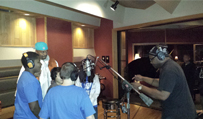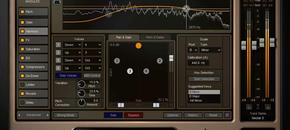
Access every part of your vocal chain and get professional-sounding vocals in seconds. A New Level of Vocal Processing: First introduced in 2010, Nectar has found a place in studios around the world, offering world-class processing designed to deliver professional results in seconds.
Izotope Nectar 2 Reviews Manual Pitch Correction
Vocal assistant: Like an extra pair of trusted ears, Vocal Assistant listens to your sound by detecting and automatically correcting volume mismatches, detecting resonance peaks, timbre variations and harsh frequencies. Vocal Assistant will intelligently tune EQ nodes, analyze dynamics and set suggested compression settings, remove annoying sibilant sibilants, create space, ambiance, and more. Stay in tune without ever leaving your DAW. The new Pitch Editor plug-in, bundled as part of the Nectar 2 Production Suite, makes manual pitch correction simpler than ever.
With a complete set of 11 vocal production effects combined in a single plug-in, Nectar treats your voice to immediate results. The pinnacle of design: Every module in Nectar 3 has been redesigned with your time and experience in mind. With new ways of interacting with key module settings, a changing interface, exciting meter animations, and new contextual selection settings, this visual experience is so fluid you won't want to go back to buttons and faders.
Most text is also dual-licensed under GFDL media licensing variesIzotope Nectar 3 is easily one of the most powerful vocal plugins for mixing, producing and polishing. Turn on the Dynamic setting, and Nectar 3 Plus tracks the vocal and. You can visualize the Unmasking via a new EQ window in Neutron, Relay, or Nectar 3, and control the effect with a new Amount slider. Vocal Assistant: Unmask talks to other iZotope plug-ins to send information and clean up audio in your mix thats clashing with your vocal. Unmask function: Links directly to the rest of your mix to place vocals in the foreground while moving other elements of the mix.
It is hosted by the Wikimedia Foundation, an American non-profit organization funded mainly through small donations. A visitor spends an average time on Wikipedia of 3 minutes and 45 seconds each day. It is the largest and most-read reference work in history, and consistently one of the 15 most popular websites ranked by Alexa as of 2021, Wikipedia was ranked the 13th most popular site. Individual contributors, also called editors, are known as Wikipedians.
Wikipedia has received praise for its enablement of the democratization of knowledge, extent of coverage, unique structure, culture, and reduced amount of commercial bias, but criticism for exhibiting systemic bias, particularly gender bias against women and alleged ideological bias. In 2006, Time magazine stated that the policy of allowing anyone to edit had made Wikipedia the "biggest (and perhaps best) encyclopedia in the world", and is "a testament to the vision of one man, Jimmy Wales". Its combined editions comprise more than 57 million articles, attracting around 2 billion unique device visits per month, and more than 17 million edits per month (1.9 edits per second). Initially available only in English, versions in other languages were quickly developed.


On January 10, 2001, Sanger proposed on the Nupedia mailing list to create a wiki as a "feeder" project for Nupedia. Wales is credited with defining the goal of making a publicly editable encyclopedia, while Sanger is credited with the strategy of using a wiki to reach that goal. Nupedia was initially licensed under its own Nupedia Open Content License, but even before Wikipedia was founded, Nupedia switched to the GNU Free Documentation License at the urging of Richard Stallman. Its main figures were Bomis CEO Jimmy Wales and Larry Sanger, editor-in-chief for Nupedia and later Wikipedia.
Nupedia and Wikipedia coexisted until the former's servers were taken down permanently in 2003, and its text was incorporated into Wikipedia. Language editions were also created, with a total of 161 by the end of 2004. Number of English Wikipedia articles Wikipedia gained early contributors from Nupedia, Slashdot postings, and web search engine indexing. Bomis originally intended it as a business for profit. Otherwise, there were initially relatively few rules, and it operated independently of Nupedia. Its policy of "neutral point-of-view" was codified in its first few months.
Others suggest that the growth is flattening naturally because articles that could be called " low-hanging fruit"—topics that clearly merit an article—have already been created and built up extensively. A team at the Palo Alto Research Center attributed this slowing of growth to the project's increasing exclusivity and resistance to change. Around 1,800 articles were added daily to the encyclopedia in 2006 by 2013 that average was roughly 800. Though the English Wikipedia reached three million articles in August 2009, the growth of the edition, in terms of the numbers of new articles and of editors, appears to have peaked around early 2007. Wales then announced that Wikipedia would not display advertisements, and changed Wikipedia's domain from wikipedia.com to wikipedia.org. Citing fears of commercial advertising and lack of control, users of the Spanish Wikipedia forked from Wikipedia to create Enciclopedia Libre in February 2002.
Two years later, in 2011, he acknowledged a slight decline, noting a decrease from "a little more than 36,000 writers" in June 2010 to 35,800 in June 2011. Wales disputed these claims in 2009, denying the decline and questioning the study's methodology. The Wall Street Journal cited the array of rules applied to editing and disputes related to such content among the reasons for this trend.
One square represents 10,000 articles. In the November 25, 2013, issue of New York magazine, Katherine Ward stated, "Wikipedia, the sixth-most-used website, is facing an internal crisis." MilestonesCartogram showing number of articles in each European language as of January 2019. In July 2012, The Atlantic reported that the number of administrators was also in decline. A 2013 MIT Technology Review article, "The Decline of Wikipedia", questioned this claim, revealing that since 2007, Wikipedia had lost a third of its volunteer editors, and that those remaining had focused increasingly on minutiae.
In 2014, it received eight billion page views every month. As of March 2020 , it ranked 13th in popularity according to Alexa Internet. This marked a significant increase over January 2006, when Wikipedia ranked 33rd, with around 18.3 million unique visitors. With 42.9 million unique visitors, it was ranked #9, surpassing The New York Times (#10) and Apple (#11). Languages are grouped by language family and each language family is presented by a separate color.In January 2007, Wikipedia first became one of the ten most popular websites in the US, according to comscore Networks.


 0 kommentar(er)
0 kommentar(er)
